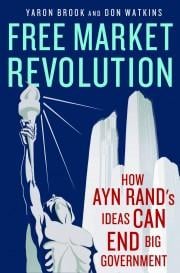The philosophy of Ayn Rand has made its way to the presidential campaign. The head of the Ayn Rand Institute, Yaron Brook, joins us on Chicago Tonight at 7:00 pm to talk about Rand's philosophy, and why he thinks it may hold the solution to America's economic woes. Read an excerpt from Free Market Revolution, a book that Brook co-authored with Don Watkins.
Introduction
In 2007, Ayn Rand’s novel Atlas Shrugged sold 185,000 copies, an all-time record for the book. Fifty years after it was first published, readers were still captivated by Atlas’s unforgettable characters, its gripping plot, and its challenging ideas. We at the Ayn Rand Institute were elated but not entirely surprised. Thanks in part to our efforts, sales of Atlas Shrugged have been growing since Rand’s death in 1982. But even we did not expect what came next.
In late 2008, as the economy experienced a devastating financial cri- sis followed by an avalanche of government intervention, sales of Atlas Shrugged skyrocketed. By the end of the year, it would sell more than 200,000 copies. In 2009, that number would reach half a million. In a world where 98 percent of new books sell fewer than 1,000 copies and the typical best seller doesn’t break 100,000, Atlas Shrugged was a phenomenon.
And it wasn’t just book sales. Referring to Atlas, bloggers debated whether it was time to “Go Galt.” Tea Party activists carried signs declaring “Ayn Rand Was Right.” Pundits, TV hosts, talk radio personalities, and even politicians were praising Rand and recommending her books. Ayn Rand was everywhere.
Why were people turning en masse to an author who had been dead for more than a quarter century? On one level it was the striking parallels between Atlas Shrugged and present-day America. Atlas describes a world hit by economic ruin, a world where every problem is blamed on “greedy” businessmen, and where the “solution” is invariably to cede more power to the state. After eight years of Bush and eight minutes of Obama, it sounded all too familiar.
The deeper reason, however, was that Americans were looking for answers. What had gone wrong? Was it too much greed or perhaps too much government? Had the state grown too big? How could it be limited to its proper purpose? What is the proper purpose of government? What should be my purpose as an individual? Is it right to pursue wealth, success, and happiness—or is that selfish and immoral? Can I even trust my own mind in such complex issues, or should I listen to some authority, such as my teacher, my minister, Glenn Beck, or Jon Stewart?
Rand provides challenging new answers to just these questions. Her answers defy convention, but that is part of their appeal. It was a conventional path, after all, that led to economic meltdown and an ever-expanding government. A growing number of Americans were ready to hear Rand’s message: that many of our standard views about morality, politics, economics, and life are corrupt and need to be thrown out. (Some people mistakenly believed that Rand’s ideas were mainstream and in fact helped shape the economic policies that created the financial crisis. As we show in chapter 4, this wasn’t even close to true.)
Rand, however, is not primarily a critic. She does not simply censure the mainstream—she defines and fights for a revolutionary ideal to re- place it: a new philosophy of individualism. “My philosophy, in essence, is the concept of man as a heroic being, with his own happiness as the moral purpose of his life, with productive achievement as his noblest activity, and reason as his only absolute.”
This book is written from the perspective of Ayn Rand’s philosophy, and all of the philosophic ideas in it are hers. (This is true even in the many cases where we don’t reference her directly.) But the focus of the book is not Rand’s philosophy as a whole but one element of it: her moral defense of free markets. We aim to show how the ideas of Atlas Shrugged help explain today’s political and economic world and provide the intellectual ammunition to take down Big Government.
“Big Government,” by the way, is not our favorite term. The problem with government today is not its size per se but its role in the economy and in our lives. The problem is what government does: Instead of performing the delimited function the Founders assigned it—protecting individual rights—the government intervenes in our lives in countless ways, restricting our freedom, redistributing our wealth, and erecting barriers to our pursuit of happiness. Yes, it is too big, but it’s too big because it is no longer limited by the principles of the Declaration. If it was up to us, we would label the threat “Statist Government.” But “Big Government,” as inexact as it is, does suggest the essential idea: The Founders’ vision of limited government has been replaced by an unlimited government, and something has to be done to restore those limits.
This book is written in the conviction that those limits cannot be restored until Americans understand and reject the ideas that cause government to grow. Although many of us claim to want smaller government, we keep electing politicians who openly tell us that they intend to make government bigger. We don’t like the idea of Big Government, but many of us do like the individual handouts, subsidies, regulations, and government favors that it entails. We think these are necessary, good, and noble. When a politician does try to cut government, popular support for his efforts almost always erodes in the face of charges that he is cruel, hardhearted, mean-spirited.
To change the trajectory of the country, we have to change the way we look at free markets. This is what we call the Free Market Revolution. It is a revolution in the way people think about markets and about the central activity that takes place on them: the self-interested pursuit of profit. It is the moral attack on self-interest and the profit motive that has led us farther and farther away from the profit system, and only a moral defense of self-interest and the profit motive can save us.
We are not the first to observe that behind the growth of the state lies a moral attack on the free market. A number of recent works have tried to argue that capitalism is a moral system, but for reasons very different from ours. Free markets, they say, need not celebrate self-interest. Self-interest can be tolerated without being glorified. Capitalism—so long as it is tempered by appropriate levels of regulation and wealth redistribution—is good despite being fueled by man’s “lower motives”; good, because it raises up the poor, because it promotes hard work and other “bourgeois” virtues; good because, despite its flaws, the alternatives are worse. As economist Deirdre McCloskey puts it in The Bourgeois Virtues, a work touted as a powerful moral defense of capitalism, “markets and the bourgeois life are not always bad for the human spirit.”
If the best that capitalism’s defenders can muster is that vice sometimes, somehow, leads to good, that capitalism is “not always bad for the human spirit,” that a free market is to be embraced because it is less awful than a socialist dictatorship, is it any wonder that government’s power over the market has been growing, decade after decade?
If we are going to succeed in ending Big Government, we have to recognize that a halfhearted defense of free markets is worse than no defense at all. We have to recognize that capitalism—full, unregulated, uncontrolled, laissez-faire capitalism—is not simply “less bad” than any alternative: It is the only moral economic system in history. And, further, that it is moral not because it helps the poor or teaches us to be good citizens but because it enables the individual to make the most of his own life—to exercise his mind, take risks, make money, pursue and achieve his own happiness.
This is the Free Market Revolution: It is the idea that economic freedom can flourish only in an America that celebrates selfishness—the individual’s pursuit of his rational, long-term self-interest—as a virtue.






